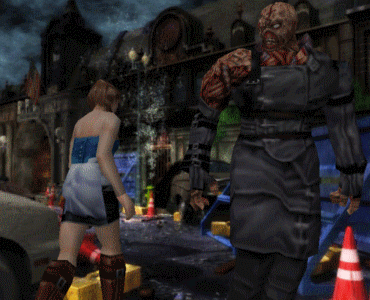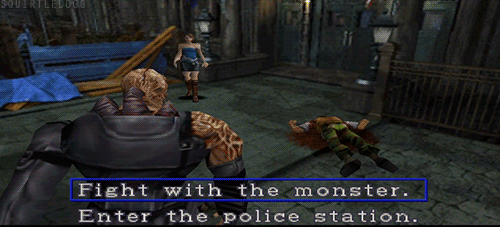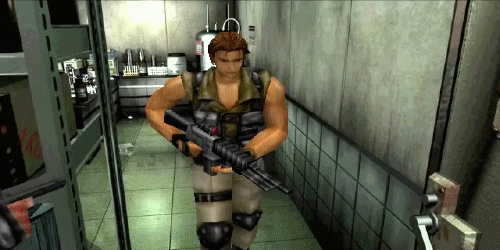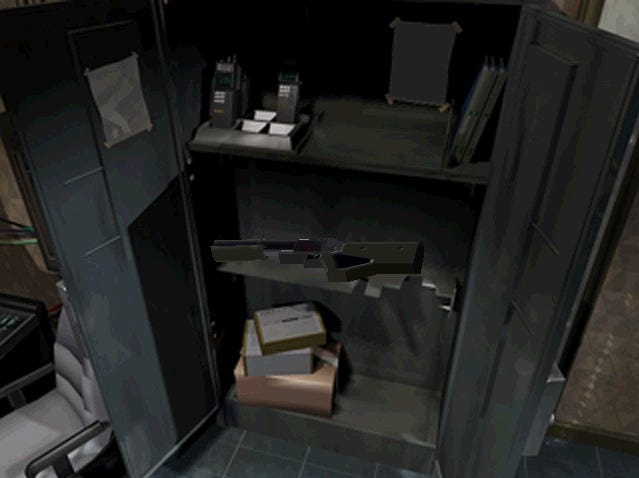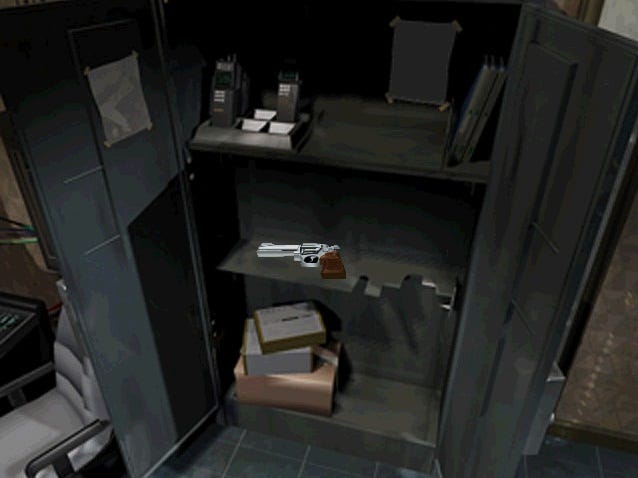The Quantum Mechanics of Resident Evil: Nemesis
Analysis of the classic survival horror game that also shares some similarities with Schrödinger's cat. Hear me out.
When I hear of Schrödinger’s cat, I reach for my pistol
- Stephen Hawking
There definitely are some Schrödinger’s cat scenarios that play out where things ARE both one way and simultaneously another, or some items in the game are unknowably in multiple places, until actually observed.
Also this is the 1999 version of the game, not the 2020 remake (that sadly has none of these great qualities).
Here is ‘City of Ruin’, my personal favorite track from the game, if you want some Resident Evil ambience while reading.
So, after recently revisiting the game, I started to think about some of its aspects a bit differently. Immediately after entering the police station and receiving the magnum, a realization about that event hit me, which I instantly connected to quantum mechanics. This led to me think about the rest of the game and where and how various events and aspects are also sort of quantum mechanical. I will attempt to break it down to the best of my abilities.
Randomness
Randomness (Probabilities) and Quantum Mechanics are deeply intertwined, so let me briefly talk about the randomness in this game and then I’ll immediately jump into the quantum mechanical-ness of it all.
Nemesis employs quite a lot of randomness (compared to other games in the series) to keep players guessing, which is actually great for survival horror, and also replay value. If you’ve ever played this game more than once, you’ll find out that the second time is likely different from the first, since the game has many moments where the player can decide the outcome of events, or item and enemy locations are randomized. Even playing the game once, will have you wondering, “What if I made a different choice?”, many times throughout.
The randomness in Nemesis is however not the crazy amount of randomness you might find in a rogue-like game such as Moonlighter, where each time you enter the same dungeon, the entire layout of the map, items and enemies are all procedurally generated. Nemesis has a more subtle and discrete randomness. I have a lot to say about randomness when it comes to game design, but I’ll save that for another time. Let’s just say that Nemesis makes use of randomness beautifully, adding just the right amount so you’re never 100% sure how things will play out.
Randomness and the Wave Function
Sure you can say that any game that has randomness can be compared to quantum mechanics in some way, where the outcome of any random number generator that the game uses is similar to the outcome of a wave function collapsing from a superposition of all of its possible states to just one.
In Nemesis, the most prevalent example of this is with the placement of random items or enemies in specific areas. Sometimes there will be a set of green herbs in a location, sometimes it will be red. Sometimes the player enters an area and finds three zombies ready to attack and on another playthrough when reaching the same area, they will be replaced by zombie dogs instead.
But there are other ways in which Nemesis compares to quantum mechanics that help it stand apart from most other games doing things similar to this.
Choices and Many Worlds
There are some key moments where player is literally asked to choose one of two distinct choices.
While not every event such as this has THAT great of an impact on the game, the ones that do, do so in significant ways.
There are other moments where the player is presented with a choice but it’s done so in a way that they might never even notice.
When first reaching the downtown area players can either end up first at the restaurant or the newspaper building.
When collecting supplies for the tram, players are free to choose the order to collect them in.
When in the hospital they can choose which floor to go to first using the elevator.
All of these decisions alter which path the player will take next, and can change which events happen in which locations, such as where certain characters will meet, but also those events can play out very differently.
In extremes cases, paths and events are completely replaced with others, such as where and how characters will/won’t die, and how much of the overall plot is actually filled out.
For example, when reaching the pharmaceutical office, the player finds either Carlos or Nikolai depending on previous choices, both about to shoot an infected teammate. In the former case, the player gets a look at Carlos’s humane, caring personality, hesitant to shoot, and distraught after the fact. In the latter case however, the player discovers Nikolai’s not-so-humane side, showing no hesitation shooting his teammate, and even sticking around to analyze the situation on his computer, showing that maybe he has other motives for even being here.
I relate this to the many worlds of quantum mechanics, where every one of the previous choices the player makes splits the universe into each of the outcomes of that choice. One version of the player ends up meeting Carlos in their universe, while another version of the player now in another universe ends up meeting Nikolai.
While most of the game is very linear, it has these specific moments where the events of the game are forked in this manner by the player’s choice into one of two directions, causing the them to exist in one of the different universes the game has to offer.
Quantum Entanglement
This is THE example of quantum mechanics in Resident Evil: Nemesis which encouraged me to write this article when I made the connection.
There are certain sets of items in the game which are in my favorite way described as entangled, where as soon as the state of one is revealed, instantaneously so is the state of the other. Such as discovering gun powder in one location, would instantly mean that a different type of gun power, or herbs will be found at another known location. And these are interchangeable and randomly decided each playthrough.
The best example is with the Grenade Launcher and the Magnum. These two items are linked in such a way that as soon as the player finds one at a specific location, the other weapon will undoubtedly appear at a specific other location.
And alternatively.
The information is known in such a way that if you measure the real world distance between the two objects in game, the information would be traveling faster than the speed of light, which is impossible unless the state information being determined was from two entangled particles.
This is obviously not the case here since the information is actually stored in the memory of the system that is running the game code, where the data is being stored and read at relatively close to the speed of light, even though the “in game” distance is much greater.
Can we use that idea to compare to what the underlying substrate of our own universe might be to allow things like quantum entanglement. Is our universe being simulated or projected in some way, and that the system doing the simulation or projection has information stored in a way that allows for seemingly instant state information exchange in the universe across “vast” distances? A larger topic for another time, but crosses my mind often.
Finally
As I mentioned, Nemesis has choice and randomness which change what can happen during the game, and particular items and events are quantum mechanically entangled, seemingly. The game also does a great job making sure not to over do it with the amount of randomness or potential outcomes or paths to go down, so that the ultimate question becomes, which of the finitely many universes of Resident Evil: Nemesis are you going to get?
I agree that Nemesis is not the only game where you can draw these parallels, but I find that the one’s here are just so unique and apparent. Not to mention the realm of quantum mechanics is weird and strange and scary, and to quote Einstein, “Spooky”, and those adjectives and themes pair so well with the classic survival horror you get with Resident Evil: Nemesis.
Now let’s all grab a cold one and play the Resident Evil 4 Remake that just released today.



